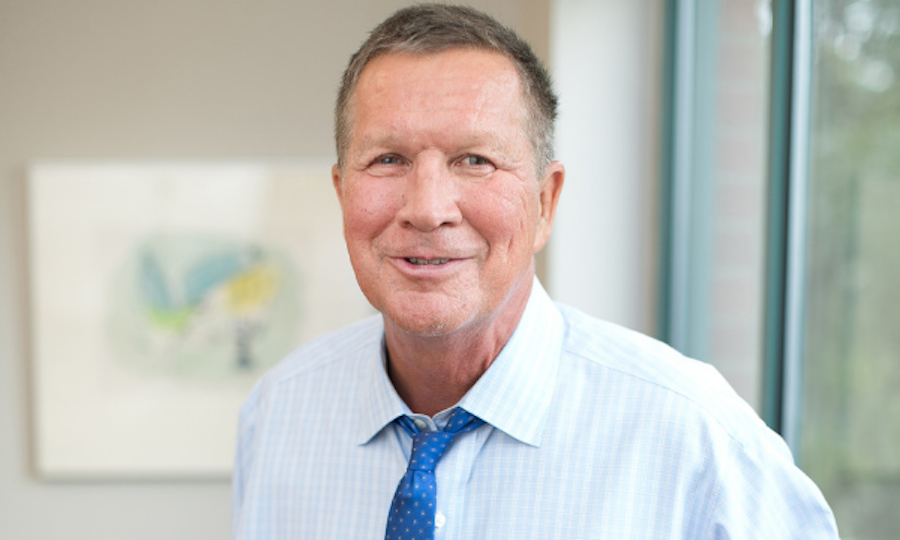John Kasich Advises to ‘Step Off the Treadmill’ to Get the Most Out of Life

I don’t know about you but my days are crammed with so much stuff I sometimes worry how I’ll find the time to breathe. There’s always something lining up for my attention, a long list of calls and emails I need to return, a pile of newspapers and magazines I mean to read, meetings I need to prepare for and attend, and it’s tough to shut all of that off and get any kind of perspective or direction.
Now, I understand full well that a great many people are out there trying to get and keep ahead. Our workaday lives can be all-consuming. We’re coming and going and moving every which way, pretty much all of the time. That’s the reality we live in. Most folks, they believe that if they’re not moving forward they’re falling behind. They have no choice but to chase their paycheck. They’ve got student loans to repay, mortgages to service, mouths to feed. I get that—and believe me, I’m not looking to talk anyone down from that position. Trying to make ends meet puts a lot of us on an endless loop, where time always seems to be running out on us, and it starts to feel like we’re going through the motions of living. Some of us are working two or three jobs just to keep our households going, and I’m not suggesting here that this rush to solvency isn’t important—heck, it’s vital.
But what’s also vital is the need to step off the treadmill for a beat or two, every here and there. Let’s call it a rush to silence—and let’s agree to take a look at how we might dial down the heat and haste of our days. Much as we might think we need to fill every waking moment in a seemingly productive way, to keep moving full speed ahead, all out, all the time, in truth we all need to take a moment.
My great friend Tom Barrett, a clinical psychologist, has lately devoted much of his practice to the therapeutic benefits of slowing down. In the leadership training he offers, he helps clients reclaim a measure of control in their high-speed, high-stakes, high-stress lives. One of the ways he does this is by reminding them of the need to hold fast to what he calls the T3 Principle—Time to Think. “Without exception,” he tells me, “when I talk to leaders around the world, I talk to them about this and get this involuntary flash of recognition. They all tell me it’s so true. They need to learn to make that time, to distinguish between what needs their attention and what demands their attention.”
One of the great metaphors Tom uses to explain the importance of mind management is to compare our bodies to a computer. “Our brains are like our software,” he says, “and from time to time we need to do virus scans on them. We need to update them. We need to understand the system that’s running the entire operation.”
What this means, for a lot of us, is that we must make an extra effort to be alone with our thoughts. That can be hard. We should also find room in our days for friendships that have nothing to do with work, nothing to do with family, because these relationships offer us endless opportunities to unwind among like-minded souls. I know a great many people who are constantly moving and shaking, to the point where they can’t bring themselves to sit still long enough to reflect on how their days are going. They don’t have time for friends…they barely have time for family…and to them, the idea of sitting in silence with nothing but their random thoughts to fill the time is plainly terrifying. Believe me, I know what it’s like to feel unsettled when there aren’t a million things going on, but I’ve come to realize the enormous riches to be found in reflection and quietude—because, let’s face it, we are happier, healthier, friendlier, and more creative when we slow down.
It’s tough for me to sit here and tell a single mother who gets up at five each morning to make breakfast, pack her kids’ lunches, check their homework, and head out before the sun to punch the clock at the first of her two jobs that she ought to slow down. That’s not the right message, is it? But what I can tell that single mom, and anyone else who’s working so hard it feels like they’re up against it, is that we can all find a point of pause in our days and steal a moment of quiet reflection.
We all need time to think, right? To consider…to reconsider.
Excerpted from It’s Up To Us: Ten Little Ways We Can Bring About Big Change by John Kasich. © 2019 by John Kasich. Used with permission by Hanover Square Press/HarperCollins.
This excerpt was featured in the Oct. 13th edition of The Sunday Paper. The Sunday Paper inspires hearts and minds to rise above the noise. To get The Sunday Paper delivered to your inbox each Sunday morning for free, click here to subscribe.


